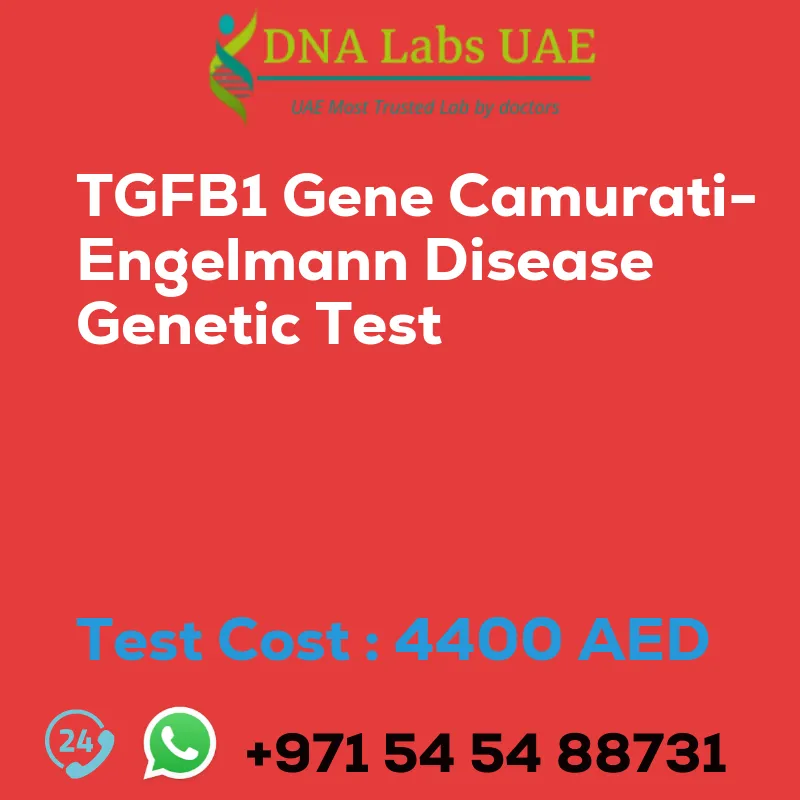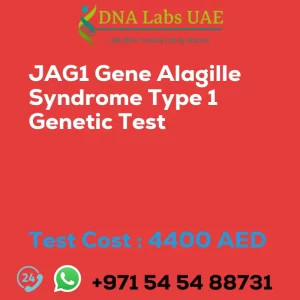TGFB1 Gene Camurati-Engelmann Disease Genetic Test
At DNA Labs UAE, we offer the TGFB1 Gene Camurati-Engelmann disease genetic test. This test is designed to analyze the TGFB1 gene, which is associated with a rare genetic disorder called Camurati-Engelmann disease (CED). CED is characterized by the progressive thickening of the bones, particularly in the long bones of the arms and legs. Individuals with CED may experience pain, muscle weakness, and difficulty with movement.
Test Components and Price
The TGFB1 Gene Camurati-Engelmann disease genetic test is priced at 4400.0 AED. The test requires a sample condition of blood or extracted DNA, or one drop of blood on an FTA card.
Report Delivery and Method
After the sample is collected, the report will be delivered within 3 to 4 weeks. The test utilizes NGS (Next-Generation Sequencing) technology to analyze the genetic material.
Test Type and Doctor
The TGFB1 Gene Camurati-Engelmann disease genetic test falls under the category of dysmorphology. It is recommended to consult with a pediatrician for this test.
Test Department
The test is conducted in our Genetics department, where our specialized team performs the necessary analysis and interpretation of the genetic data.
Pre Test Information and Genetic Counseling
Prior to undergoing the TGFB1 Gene Camurati-Engelmann disease genetic test, it is important to provide the clinical history of the patient. Additionally, a genetic counseling session is recommended to draw a pedigree chart of family members affected by TGFB1 Gene Camurati-Engelmann disease. This session will help individuals understand the implications and potential outcomes of the test.
Test Details
The TGFB1 gene is associated with Camurati-Engelmann disease (CED). NGS genetic testing allows for the simultaneous analysis of multiple genes, including TGFB1. By identifying mutations or variations in the TGFB1 gene, this test can confirm a diagnosis of CED and provide genetic counseling for affected individuals and their families.
To perform the NGS genetic test for CED, a DNA sample is required. This can be obtained through a blood sample or saliva sample. The DNA is then sequenced using NGS technology to identify any genetic changes in the TGFB1 gene. These changes can include point mutations, insertions, deletions, or other variations that may disrupt the normal function of the gene.
The results of the NGS genetic test can help healthcare professionals determine the specific genetic cause of CED in an individual. This information is crucial for guiding treatment options and management strategies for the disease. It also aids in family planning, as it identifies individuals who may be at risk of passing on the disease to their children.
It is important to note that NGS genetic testing for CED is typically performed in specialized laboratories and may require a referral from a healthcare professional familiar with genetic testing and rare genetic disorders. Genetic counseling is also recommended both before and after testing to ensure individuals fully understand the implications and potential outcomes of the test.
| Test Name | TGFB1 Gene Camurati-Engelmann disease Genetic Test |
|---|---|
| Components | |
| Price | 4400.0 AED |
| Sample Condition | Blood or Extracted DNA or One drop Blood on FTA Card |
| Report Delivery | 3 to 4 Weeks |
| Method | NGS Technology |
| Test type | Dysmorphology |
| Doctor | Pediatrics |
| Test Department: | Genetics |
| Pre Test Information | Clinical History of Patient who is going for TGFB1 Gene Camurati-Engelmann disease NGS Genetic DNA Test. A Genetic Counselling session to draw a pedigree chart of family members affected with TGFB1 Gene Camurati-Engelmann disease NGS Genetic DNA Test gene TGFB1 |
| Test Details |
The TGFB1 gene is associated with a rare genetic disorder called Camurati-Engelmann disease (CED). CED is characterized by progressive thickening of the bones, particularly in the long bones of the arms and legs. This can lead to pain, muscle weakness, and difficulty with movement. NGS (Next-Generation Sequencing) genetic testing is a type of genetic test that can analyze multiple genes simultaneously. In the case of CED, NGS can be used to identify mutations or variations in the TGFB1 gene that may be causing the disease. This can help in confirming a diagnosis and providing genetic counseling to affected individuals and their families. NGS genetic testing for CED involves obtaining a DNA sample, usually through a blood sample or saliva sample. The DNA is then sequenced using NGS technology to identify any genetic changes in the TGFB1 gene. These changes can include point mutations, insertions, deletions, or other variations that may disrupt the normal function of the gene. The results of the NGS genetic test can help healthcare professionals determine the specific genetic cause of CED in an individual. This information can be used to guide treatment options and management strategies for the disease. It can also be useful for family planning purposes, as it can help identify individuals who may be at risk of passing on the disease to their children. It is important to note that NGS genetic testing for CED is typically performed in specialized laboratories and may require a referral from a healthcare professional familiar with genetic testing and rare genetic disorders. Genetic counseling is also recommended both before and after testing to ensure individuals fully understand the implications and potential outcomes of the test. |








